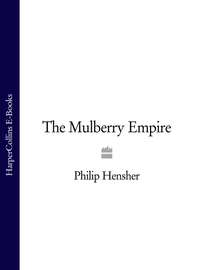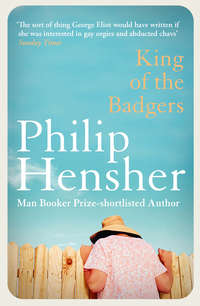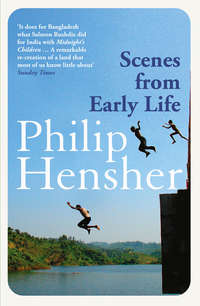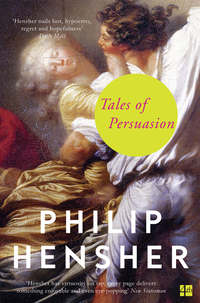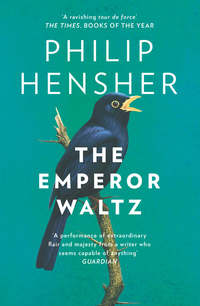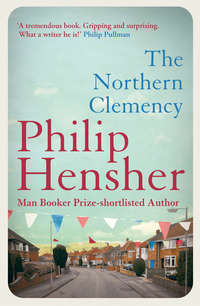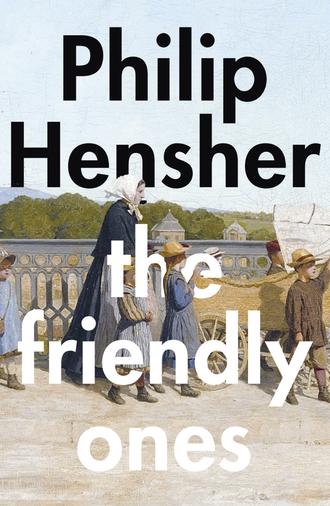
Полная версия
The Friendly Ones
The food at Aunt Blossom’s was sometimes OK but sometimes frightening – they ate things that had been shot, things that were bleeding, things with bones and innards and eyes still looking at you. Josh didn’t believe that anyone liked these things, plucking lead shot from their teeth or wiping blood from their mouths. They ate them because they thought they ought to. Even at breakfast the food could be frightening. The cousins had finished with their kippers and their kedgeree, a kind of fishy risotto but nastier, and were now piling marmalade onto their plates from a glass bowl with a glass spoon. The Japanese nanny was eating something of her own confection, something white, puréed, babyish; with her other hand she was feeding baby Trevor pieces of toast, cramming it in between the baby’s sneezes and coughs. The two eldest cousins, Tamara, who was Josh’s age, and Tresco, who was two years older, fourteen, old enough to have his own gun, were speaking to each other in Japanese, mostly ignored by the nanny. Their sentences barked and yelped at each other across the silverware; Josh felt pretty sure they were being as rude about him and Mummy as they could manage in Japanese. Underneath the strange no-go-ho-ro-to yelping of their secret language, Josh could hear the usual twittering yawning intonations of his cousins; they didn’t sound like the Japanese nanny at all when they spoke her language. The third cousin, Thomas, gazed at Josh as if not quite sure what he was doing here; when Josh was not there, he was the one they ‘teased’, as they put it, with his prole’s sweet tooth and his grasp of Japanese that was (Tamara said) all that could be expected, frankly, of a seven-year-old. The baby, Trevor, sat dully with toast and marmalade all over her face, waiting for more food, and thought her own thoughts. Josh believed that Trevor was the most evil of all of them.
‘It’s going to be fine today,’ Uncle Stephen was saying. ‘What’s everyone’s plans?’
Josh looked, agonized, at Mummy. Her cereal spoon paused for a moment; she very slightly shook her head. She didn’t want him to say anything. Josh thought of the book he had started reading yesterday, permitted by the heavy rain; he thought of Bevis, running down a hill to build a dam across a stream, to catch frogs and fish for trout with his bare hands. How exciting Bevis was! He longed to stay inside in a quiet quarter and read all about his adventures, and let his cousins rampage around outside, catching trout for real. Beyond the grounds was the Wreck, with the disgusted village children kicking at stones and stomping on frogs. That was more terrifying still.
‘I don’t want to see you children inside until luncheon. It’s far too nice a day to be mouldering about inside,’ Uncle Stephen said, from behind his newspaper. ‘I’m looking particularly at you, Joshua.’
‘Josh doesn’t like mud,’ Tamara said, quoting something Josh had said once, years ago, when he had not wanted to sit down in a water-meadow at her command. ‘He can’t bear it. Thinks it’s awful. He won’t want to come out today.’
‘Nonsense,’ Uncle Stephen said. He lowered his newspaper; looked over his glasses, down his nose at Tamara on the other side of the table. He was talking, nevertheless, to Josh. ‘It’s a beautiful day.’
‘Ho-to-go-so-mo-to Josh,’ Tresco said.
‘To-ho-ro-mo-so Josh go,’ Tamara said. The Japanese nanny raised her eyes to heaven, shook her head, whistling in frustration. ‘It will be a little muddy, I think. But mud never killed anyone, not that I heard of.’
‘Josh wants to go out,’ Aunt Blossom said. She was a warm, interested presence at the far end of the table; she was smiley and caressing; she always got everything wrong. ‘Do you think there’s no fresh air in Brighton? Josh probably knows a good deal more about fresh air than you do, living right on the English Channel.’
‘We’ll go into the woods,’ Tresco said. ‘May I take my gun, Papa?’
‘Of course not,’ Uncle Stephen said. ‘Find something else to entertain you.’
‘What a lovely way to spend a morning,’ Mummy said. ‘Just messing about in the woods. I can’t imagine anything more fun. I’m sure you’re going to find something intensely dramatic.’
Uncle Stephen lowered his Daily Telegraph, stared at Mummy. ‘Intensely … dramatic?’ he said. ‘Catherine, what an impressive thing to say. What an awfully … Brighton thing to say. You make it sound like … like …’
‘Oh, you know what I mean,’ Mummy said, in the way she had when she had said the wrong thing. But Josh could not see what she had said wrong. It appeared to him to be about the best thing that anyone could say about what might happen, once he went with his cousins into the gloom of the purple-edged woods; the world that lay beyond the lawn, beyond the ha-ha, at the end of the wilderness, the world in the woods that Uncle Stephen had bought two years ago and was still deciding what he would do with it. He wanted to go back to Brighton, where you could say ‘intensely dramatic’ if you felt like it.
2.
‘What news from Sheffield?’ Stephen said, setting down his paper with a rustle and a sigh.
‘No news,’ Blossom said. ‘I spoke to Daddy last night. He is extraordinary. I asked him about Mummy, and he said just, “Oh, fine, fine,” and then started telling me this immense story about the neighbours. I can’t work out whether we should go up there or not.’
‘Please, let’s not go up there a moment before it’s strictly necessary,’ Stephen said.
‘I love Granny and Grandpa,’ Tamara said. ‘I love dear South Yorkshire, and Sheffield I love best of all.’
‘Oh, shut up, you ghastly little snob,’ Blossom said. ‘You really are the bally limit.’
‘Who are the new neighbours?’ Catherine said.
‘Daddy was telling me all about them,’ Blossom said. ‘They had a party, or something, and, my goodness, somebody nearly died but didn’t.’
They had lived in the house in Devon for seven years now. ‘Made a packet in the City,’ had been Stephen’s explanation for it, ‘always wanted to come down and vegetate in the country’ was his wordage. Where had Stephen grown up? Oh, in the sticks, out in the borderlands, in the Home Counties, in Bedfordshire – the explanation and the wordage here differed. Blossom knew where he’d grown up, in a neat house with half a horseshoe drive and red, upward-pointing gables in Edgbaston; in the upstairs bedroom, blocking the view, was the back of his mother’s dressing-table, blue and gilded. It was a lovely house, where his parents had been happy and where they had still lived when Blossom had married Stephen. It was not clear why an elegant suburb of Birmingham needed to be concealed from view in this way. Nowadays the parents lived in a square white Regency villa just down the road in a sea of brown chippings, like a boiled chicken in a sea of cold Edgbaston gravy. Stephen had bought it for them, and they lived in three rooms out of thirteen. Fewer and fewer people knew or remembered that Stephen had grown up anywhere else.
This house had come seven years ago. It had a satisfying manorial address – Elscombe House, Elscombe, Devon – which suggested the seigneur and the peasants at the gates, the annual garden fête and the squire venturing out on Christmas Eve to commend the church choir. The moment had not, somehow, come for the issuing of invitations to an annual fête; it had been a mistake not to go to church and not to go to the Lamb and Flag in the village; help had been hard to find and, once installed, fast to resign. The children’s rooms were an abandoned disaster area. Soon Blossom was going to start importing help, like builders and groceries, from London, and to hell with what they thought beyond the gates.
The grounds were perfect, wild and grand, as far as they went. That was not so very far. A generation ago, much of the land had been sold and built on. The major-general and his sister Lalage, at the end, had sold rather more, before concluding that they might as well sell the whole lot to some cad in the City. Elscombe House now ran up to a wall dividing it from a new estate in yellow brick of retirement couples and young families. The best that Stephen had been able to do was to repurchase three acres of woodland that had been sold but not built on. Just beyond the newly built low wall at the far end of the copse – more a gesture of separation than an enforcement of it – was a recreation ground. The woods had been the property of the village children, for their own dark games and secret purposes; now it was the property of the four children of the big house. This change was purely legal, enforced by a wall anyone could climb over. Only the most abjectly law-abiding of the village children had stopped going into the woods because of the change of ownership, and if they called it ‘the woods’, older people in the village called it Bastable’s Beeches, after a long-dead gamekeeper. Ownership was not so easily transferred. The older children and Stephen had their guns. That was an important part of living in the country. But the grounds had been trimmed and abbreviated and squared off and sold to such a degree that there were really only one or two directions in which you could point the gun, not into the newer parts of Elscombe village or towards the house itself. It had been open to the public three days a week in season; not any more. Blossom believed the plasterwork in chinoiserie in the long gallery was rather admired by the sorts of bods who admired that sort of thing.
‘Norman said there was a family of adders in the woods,’ Blossom said neutrally. (Norman was the new gardener.) ‘Be a little bit careful for once. Don’t go trying to collect an adder in a jar.’
‘Plenty of little toads,’ Stephen said. ‘Bring those back. Make friends with them. See an underlying affinity. Is it tomorrow you have to be off, Catherine?’
‘I was supposed to hand Josh over to Leo. But he’s in Sheffield.’
‘I would just go straight up the M25,’ Stephen said. ‘It used to be hell, having to cross London, take half the time getting to Cricklewood. Just go straight across to the M25 down the Great West Road, up and over, Bob’s your uncle. The Bristol motorway, the London circular in a clockwise direction, the Leeds motorway northwards. Robert,’ Stephen said, entering a whole new world of sonorousness, ‘is your father’s beloved brother.’
‘Catherine’s not going to Sheffield, darling,’ Blossom said. ‘Enough of the walking road map. We’re talking about –’
‘Oh, I see,’ Stephen said, then pulled a funny, told-off face for the benefit of the children.
‘‒ wretched Leo, my wretched brother.’
‘It won’t be so bad,’ Catherine said. ‘I don’t mind a bit of a drive.’
‘Please may we get down?’ Tamara said. ‘Josh has finished his Coco Pops, so may he get down as well?’
‘Yes, you may,’ Uncle Stephen said. ‘I don’t want to see any of you until luncheon. My God,’ he said, ‘there’s no danger to England. As long as there’s been boys in England, there’s been woods and mischief and mornings spent getting muddy. And houses like this. Look out there, Catherine. I don’t suppose much has changed in that view since 1600. And the boys and girls getting out there to shoot and trap and run and hide and make battles in the mud. My children, doing what I did, doing what their children are going to do, in the same house, on the same land. Nothing’s ever going to change.’
The motorway ran against the purple hills, twenty miles off; the grazing was let; a small kiln and workshops against the river lay half empty, a sign permanently up on the B road. In the breakfast room of the house, a man stood, explaining about Englishness. He went on speaking, jingling his change in his pocket, like a trotting horse, and behind him the children stood one by one and left; their mother left; Catherine left; and the Japanese nanny, finally, stood up and went. Stephen let his peroration go on, though he could sense that the room was now empty. It didn’t matter. After a while he stopped jingling, fell silent, content. Soon the New York markets would open.
3.
It had been just like this when she had been married to Leo. Blossom, Leo’s sister, had descended from the start with cries of incredulity about what Catherine was proposing to do – to have two rather than three tiers on the wedding cake, to do without a honeymoon, to take a job in the local council answering the phone, to work in the private library in St James’s Square. Catherine and Leo had taken the firm decision not to tell Blossom about her pregnancy for as long as possible – it was only that it meant keeping the news from the rest of the family, and especially from Leo’s mother, that made them tell her five months in, to a torrent of smiling advice, offered with a shaking head and a gesture towards her own successes. That torrent had never yet dried up. The one thing that Blossom never tried to set Catherine right about was her divorce. Over the phone, there had been a full, satisfied silence before cries of joyous pity rang out; the news confirmed her nosy enquiry of a month before. Blossom was her great friend, of course, but she and Josh came to stay mostly for Josh’s sake: his friends in Brighton were timid, bookish, quiet, and his cousins would surely be good for him. This was their third weekend at Josh’s Uncle Stephen’s. She hoped he would not pick up an adder. She believed they were mildly poisonous.
Catherine felt that she was always resting in the interstices here at her sister-in-law’s house. In much the same way that, since her divorce and the so-surprising, pressing invitation – the first of five – from Blossom to come and stay, not any time but on a particular date, and to bring the little one too, there was always something intermediate and uncertain about the positions she found herself in. Was she a guest that Blossom and Stephen longed for, found excellent company, enjoyed being in the house? Or was there some underhand and contemptuous motive, unknown to and unspoken by even them? She had felt like discussing it with Leo on the phone or at those sad handovers, asking him what place he thought she occupied in Blossom’s life. She had a good idea, however: she knew that he would think she was invited for the sake of the retelling, so that Blossom could subsequently say to Leo, just in passing, ‘Oh, we had your ex-wife and little boy to stay last week. They are so charming, I must say.’ The pleasure of causing pain and rendering Leo’s life inadequate quite outweighed the difficulty and tedium of having Catherine and Josh as awkward presences in the house for four or five days. At some future but not at all remote point Catherine and Josh would surely be evicted from Elscombe House by her sometime sister-in-law’s husband and her sometime nephews and nieces, bearing shotguns and laughing as the sometime relations stumbled, suitcases in hand, down the gravel drive.
Breakfast finished, and the children were shooed off, going upstairs – Tresco said, over his shoulder, in a dismissive way – to dress for the woods; the Japanese nanny followed, carrying the now rather large Trevor (a girl) and puffing up the stairs towards the nursery. Catherine stood at the foot of the wooden stairs, resting her hand on the carved heraldic beasts forming the stop at the bottom of the banisters. She had been here too long: she wondered, as her mind formed the word, whether ‘banisters’ was not a word Blossom would consider common in some way. The bedroom was forbidden during the day, apart from moments when it was necessary to change clothes and quietly to drink a little vodka from the bottle she had brought; in any case, there was nowhere to sit, apart from a hard cane chair. She could read her book, but she had already finished it; there was nothing to read in the house, apart from the dutiful books the children ought to read and the forbidding leather-bound antiquities that had gone to make the library, bought with the house by Stephen. What did people like her read in a house like this? There was no place for a person like her in a house like this. She stood at the foot of the stairs, wondering whether she could justify going out for a walk to the village. The pub would not be open yet.
‘I’ve got some dull letters to write,’ Blossom said, having followed the girl clearing the breakfast table out into the hall, berating her all the while. ‘It’s no pleasure. Come and sit with me and we’ll chat. Stephen’s in his study all day, manipulating investments, I suppose.’
Without waiting for an answer, Blossom continued on her way, following the skivvy through the green baize door underneath the stairs that led to the old kitchen. There were meals to order, tasks to assign, purposes to fulfil. Catherine tried to remember which was the morning room – the little square yellow one, she thought, at the back of the house with the ugly china pug in it.
There was a rumpus from the first floor, and down the double staircase, proceeding underneath the Burne-Jones stained-glass window, the children thunderously came. The two middle ones, Tamara and Thomas, were first, and dressed unexpectedly, Tamara in a full-length white lace ball-gown, a First Communion frock in a Roman Catholic country. She had pink ribbons in her hair. Her brother Thomas was dressed for the same occasion, in blue velvet knickerbockers and a foaming white shirt to match his gleaming white stockings; he was wearing a pink bow-tie, not very expertly tied. But Tresco and Josh, behind, confident and shamefaced by turn, they were dressed just as they had been at the breakfast table.
‘Going somewhere?’ Catherine asked Tamara.
‘Don’t tell Mummy,’ Tamara said. ‘There’s a good Aunty Catherine.’
‘We’re just going to the Wreck,’ Tresco said. ‘Goading the proles.’
‘I see,’ Catherine said. ‘Well, don’t shoot any of them. You won’t be popular if you wade through the woods in that dress, Tamara.’
‘There’s something called a dry-cleaner’s,’ Tamara said. ‘Poor little Thomas. He hates his Faunties ‒ he simply loathes them.’
‘They made me,’ Thomas said, his face screwed up with rage as they processed past their aunt; their usual way into the grounds was through the drawing room and its French windows. Catherine caught her son’s head and rumpled it as it passed. He looked back: shame, fright, secrecy all melded in his look. They would find an excuse not to come next time they were asked.
‘It’s rather nice to see them all getting on, the cousins,’ Blossom said, emerging from the servants’ quarters. ‘There’s no accounting for children and whether they’ll get on with each other. I always tell my children it’s just not on to be fussy about food, to like this food or that food, and it’s not on to like some people and think you don’t like others.’
‘Oh, I don’t know,’ Catherine said, following Blossom towards the morning room. ‘I think you’re allowed to like some people more than others.’
‘If you’re grown-up you are,’ Blossom said. ‘Good morning, Mrs Bates. Everything all right? Good, good. If you’re grown-up you’re perfectly permitted to have likes and dislikes about people or food or anything else. I’ll make a confession to you – I absolutely can’t bear desiccated coconut. I can’t bear it. But I’m sure that I wasn’t allowed to say that I wouldn’t have this or I wouldn’t have that when I was a child. And it was exactly the same with people. Get on with everyone and the world will be a much easier place. That’s my motto.’
‘Leo’s absolutely stiff with likes and dislikes, what he won’t eat, and who he gets on with at work and who he can’t abide.’
‘Well, there you are, then,’ Blossom said illogically. As so often, when she talked grandly but vaguely about her past, she seemed to have an invented, imaginary life in mind, one with ponies and acres and grandparents with Victorian principles. She had forgotten, perhaps, that Catherine had been married to her brother, and knew all about the reality of the doctor in the suburb of Sheffield and his self-pitying, indulgent wife with the hands fluttering as she spoke. ‘We’re all so fond of Josh – he’s such a nice little boy. And so fair-minded, as you say. How is he at school?’ She plumped herself down behind the writing table. On it were any number of curiosa: a set of miniature furled flags, a miniature reproduction Buddha in marble, some Japanese porcelain dishes ‒ corporate gifts that had ended up here. The better ones were in Stephen’s study. Catherine pulled the armchair out of the direct sunlight. It was still a little bit like a job interview, the way Blossom had situated herself.
‘He likes it,’ Catherine said. ‘He seems to be thriving there. It’s a lovely atmosphere – you can’t help feeling how friendly everyone is. There’s a proper feeling of helping out and thinking of everyone.’
‘Oh, Brighton,’ Blossom said. ‘I can well imagine. It sounds absolutely lovely. I know those schools, putting everyone’s welfare first, making sure no one’s left behind … I sometimes wonder, though.’
‘I know it’s not much like the sort of schools we went to,’ Catherine said.
‘Or Tresco’s school,’ Blossom said. ‘To be honest. It’s a terrific school, you know. They’re introducing Mandarin as an option. Have you ever thought about what Josh could be doing? My children can be little swine, I know, but they’re constantly vying to outdo each other, speak better Japanese than each other, run faster, survive a day in the woods without anything to eat or drink. Do they have sports day at Josh’s school?’
‘Well, sort of,’ Catherine said. ‘It’s called the Summer Festival. There are races, or there were last year, but they arranged it so there were all sorts of things that the kids could be good at in their own way. Someone won a prize for the happiest smile of the year.’
Blossom lowered her head. The sound she made could have been a cough or a suppressed snort. She concentrated for a moment on the papers on the desk – letters, mostly. She shuffled them, squared them off, plucked one from the pile and placed it on top, squared the pile again. She looked up and gave Catherine a brave, watery smile, as if beginning all over again. ‘I should have done all this yesterday, I know,’ she said. ‘I’ve been thinking and thinking about the kitchen garden – I just can’t make up my mind.’
‘The kitchen garden?’ Catherine said. Around the unpicturesque back of the house there was half an acre or so where, once, vegetables had been grown. The half-acre had been abandoned to its fate long before Stephen had bought the house. The major-general and his sister Lalage, the twin white mice to which the family had been reduced, had retained the kitchen garden, which in an Edwardian heyday had fed a family a dozen strong and a small army of helpers, carers, serfs and labourers with asparagus, beans, potatoes of waxy salad varieties as well as the floury mashing kind, tomatoes, turnips, lacy clouds of carrot tops, cucumber and lettuce; there had been a long, crumbling brick wall of soft fruit, raspberries, blackcurrants, whitecurrants, redcurrants, apricots trained against it, a full half-acre of once beautifully tended vitamin C, running up to orchards of apple and pear and plum, and the hothouses where grapes had once been grown. All that had been abandoned by the time of the major-general’s withdrawal, and that of his mouse-like sister Lalage. (How had he ever commanded anyone, with his bright, inquisitive eye, his neat and fey, almost girly moustache?) The shape of the garden remained, but the major-general and Lalage had cleared a couple of beds, and grown a few sad roots and a couple of tomato plants and lettuces. Beyond that, the tendrils and shoots and wild-flowering mass of vegetation climbed and clambered, untrimmed and unprotected; the vines pressed against the glass of the greenhouse, many panes now smashed. Stephen had instructed the gardener, Norman’s predecessor-but-seven, to get it in order, but he had taken most of an autumn to do nothing but strip it bare, or almost bare: the apricot tree had survived, espaliered against the wall, and now spread there, its branches unfurling over the blank domain. The flowerbeds in the front had been more urgent, and their care had proved a nearly full-time occupation for Norman, the new gardener, and his seven predecessors. ‘Really,’ Blossom was practised in saying, ‘we ought to have three or four gardeners, not just one. We’re never going to get anywhere. Now, the kitchen garden … I would love to do something with it. I can’t think what.’



